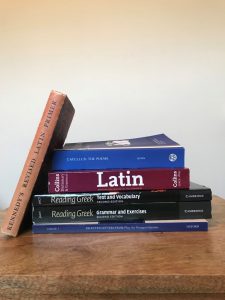Learning Greek/Latin at King’s what it is like and why you should do it

Hi everyone, my name is Sadie, and I’m a second-year Classics student at King’s. I transferred to Classics via the access pathway, and I’m loving it! Learning languages at university is different from learning languages at school, in the best way! So, today, I’d like to give you all a bit of inside info, about what it’s like to study Greek and Latin at King’s.
You don’t need to know anything
You really don’t. For lots of the Classics degrees on offer at King’s, you don’t need any prior knowledge of ancient languages, or languages in general. They will teach you everything, and there’s great support to help you all the way through. The people teaching you know that learning a language is challenging, and the teaching is structured
so that you’re consistently recapping your knowledge.
But it’s also structured so that it’s fun! There’s lots of class collaboration, discussion, and a wide variety of learning techniques. I really look forward to my language classes, because I know that they’re going to be engaging, a spirit which they have somehow managed to continue online.
It’s more rewarding than you’d imagine
 I never thought I would get so much satisfaction from my studies. I’m not going to try and challenge the reputation that Latin and Greek have, they’re tricky. But the satisfaction that comes from getting to the end of a tough translation is unbeatable.
I never thought I would get so much satisfaction from my studies. I’m not going to try and challenge the reputation that Latin and Greek have, they’re tricky. But the satisfaction that comes from getting to the end of a tough translation is unbeatable.
Plus, there’s the moment when you realise that you’re reading exactly what Pliny, Catullus or Homer wrote all those thousands of years ago. Being able to read texts in their original is a privilege that is unlike any other. The understanding that you gain, and the emotion that’s contained within the way a text is put together, is reserved for those who can read them in their original alone.
So, I think its fair to say that although they’re challenging, the satisfaction of learning them makes it all worth it.
It’s a unique opportunity
Not too many people can read these languages fluently, and so it’s a really rare opportunity to be able to learn them with the structure of the classroom, and with an amazing system around to support you in learning them. Learning them in this environment is the best way to do so, because, as with all languages, it’s important to study them frequently and constantly recap what you’re doing.
If you want to learn ancient languages, in my opinion, this is the best way to do so.
It seems strange, but because 52.5% of English derives from Latin, and 10.1% derives from Greek when studying these languages you can trace how English and other European languages have developed. For example, the word λο
languages you can trace how English and other European languages have developed. For example, the word λο
γος (pronounced log-os) in Greek, means study. So any word that you see in English that has -ology on the end of it, like astrology, epistemology or psychology, derives from the Greek. I think it’s cool to see how language has developed over time, and how we’re still using parts of the language that were developed thousands of years ago.
I hope that this post gives you an insight into what it’s like to study ancient languages at King’s, and hopefully inspires you to take advantage of the opportunity to learn them.
If you have any further questions on studying ancient languages at King’s, or just want to know a bit more about Classics here in general, drop me a message on Unibuddy.
More information:
To explore the King’s Classics Department page, click here
To read more blog posts about Arts & Humanities career options at King’s, click here
To see what other courses King’s has to offer, click here

Leave a Reply